Springing Forward & Falling Back with Daylight Savings
Whether you are “Springing Forward” or “Falling Back “, Daylight Savings Time (DST) can have a surprising impact on our internal body clocks, or circadian rhythms.
You would think that a change of an hour is not a big deal and should have minimal effect on our behavior. But the truth is more complicated, especially in an environment where we are already sleep deprived. The change in March is usually more dangerous since we lose one hour of sleep. So, you would think that returning the clock one hour in November should be helpful to us. But the evidence is more complicated, since people show some confusion, and they possibly think they could stay up later the night before so the net effect is similar to the March situation.
The fall time change isn’t associated with the same impact or level of disruption as the spring change, but it can still affect you. The shorter days and early onset of darkness can leave you feeling moody, lethargic and irritable. One study found an 11 percent increase in depression episodes in the week following the November change.
A few studies have also noted a higher risk of stroke and heart attack in the week following the transition.
Here are a few ways to ease into the time change and combat the potentially harmful effects of the end of daylight-saving time.

Set your clock back on Saturday night
The people who tend to have the most difficulty with the fall time change are early birds — those who already go to bed early and wake up early. They often find themselves wide awake an hour earlier than normal.
To help ease the transition, change your clock on Saturday night and pushing your bedtime back, rather than going to bed at your regular time.
If it’s difficult to stay awake, try doing something active, such as taking an evening stroll, rather than sitting on the couch and watching television.
Gradually adjust your bedtime
To make the transition less abrupt for your body, try to go to bed 15 to 20 minutes later each day for a few days leading up to the clock rollback
You should also begin to adjust the timing of other daily routines that are ‘time cues’ for your body, like meals and exercise.
Get outside
Many people, especially those who work in an office all day, spend little time in daylight after the fall time change because of the earlier sunset. “They may be leaving work when it’s dark, going to work when it’s dark — so they’re getting no light exposure,
Sunlight tells our circadian rhythms when we’re supposed to be tired and when we’re supposed to be awake, Try getting some exposure to sunlight first thing in the morning.
Sunlight helps reset your internal clock. Light exposure has also been shown to improve the quality of your sleep and boost your mood. If you can’t go outside, get to a window or try a light therapy box.

Maintain good sleep hygiene
Try to go to bed and wake up at roughly the same time every day, and avoid any extra dozing before bedtime.
Keep your bedroom dark, quiet and cool. Limit your use of both alcohol and electronic devices before bed and adopt a calming bedtime routine. A good bedtime routine includes doing the exact same activities in the exact same order every night. Most successful bedtime routines are 15 to 30 minutes long. They help transition the brain from a go-go-go mindset to a calmer one, so you can relax and get some sleep
Get moving
Make the most of the light in the morning and use that extra hour for a morning workout. If you can’t exercise in the morning, it’s still a good idea to incorporate some activity into your day.
Exercise has been shown in studies to improve sleep quality. It’s recommended that we get at least 150 minutes of movement or exercise per week, which could be as simple as walking 30 minutes, five days a week.
Block out light
If sunrise wakes you up too early after the clock change, install some blackout curtains. Even easier: don a sleep mask.
Your eyelids alone can’t block out all of the light, research shows. In fact, the latest research shows that sleeping in total darkness could do more than just help your sleep; it may also boost your cardiovascular and cognitive health.

Try not to stress
Try not to worry too much about the time change. Worrying about it actually just makes it worse for a lot of people. You may feel a little off for a couple of days, but most people who don’t have chronic insomnia or a sleep disorder handle the time change pretty well.
If you are concerned about adapting your circadian rhythms and exhaustion, it may be something else. Make an appointment with one of our Naturopathic doctors to help you maintain your balance in the spring or fall.

